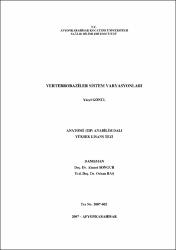Vertebrobaziler Sistem Varyasyonları
Özet
Vertebrobaziler sistem (VBS) beyin sapı, omurilik, serebellum ve serebrumun
arka bölümlerinin beslenmesini sağlayan önemli bir yapıdır. Tüm damarlarda olduğu
gibi VBS’de de birçok anomali ve varyasyon gözlenir. Klinisyenler teshis ve
tedavilerinde muhtemel varyasyonları göz önünde bulundurmalıdırlar. Çalışmamızın
amacı ülkemiz popülasyonunda VBS’ye ait muhtemel varyasyonları ortaya koymak
ve bunu literatür eşliğinde tartışmaktır. Bu amaçla Afyonkarahisar ve İstanbul
Bölgelerinden 109 adet adli otopsi materyali ve 1 adet anatomik kadavra materyaline
ait VBS değerlendirildi ve fotoğrafları çekildi. A. vertebralis (VA), a. basilaris (BA) ve
dallarının genişlikleri ölçülerek dominantlık ve hipoplazik arterler değerlendirildi.
Ayrıca varyasyonların tipleri ve yerleri belirlenerek orantısal iliski kuruldu.
Olguların %21.2’sinde sol, %17.3’ünde ise sağ tarafta VA’lar dominanttı. Yine
sağda %20.2, solda %14.4, çift taraflı ise %4.8 oranında hipoplazik VA gözlendi.
Vertebrobaziler bileşke (VBB) %20 sulcus bulbopontinus seviyesinde, %67
asağısında, %12 ise yukarısında bulundu. A. basilaris’de (BA) varyasyon olarak %1.8
oranında distal, %0.9 oranında ise proksimal segmental duplikasyonu gözlendi. A.
spinalis anterior’lar (ASA) %12.5 oranında tek bir kökten oluşuyordu. %6.3 oranında
ise ASA, VA’lar arasında uzanan transvers bir anastomozdan köken alıyordu. Ayrıca
%15.6 oranında çift seyreden ASA gözlendi. A. cerebelli superior’lar (SCA) %7.2
oranında sağ, %3.6 oranında ise sol tarafta dominant olarak bulundu. Ayrıca
SCA’nın erken bifurkasyonu (sağda %7.2, solda %12.7), fenestrasyonu (sağda %4.5,
solda %7.2), duplikasyonu (sağda %14.5, solda %12.7), ortak bir gövdeden çıkması
(sağda %6.3, solda %10) gibi varyasyonlar gözlendi. A. cerebri posterior’lar (PCA)
%15.4 oranında sağ, %20 oranında sol tarafta dominanttı. Ayrıca özellikle yaslı
olgularda çeşitli arterlerde birçok aterom plaklara rastlandı. BA’da bu oran %30
olarak saptandı.
Sonuçlarımız VBS’ye ait küçük bir örneklemede bile büyük oranda
varyasyonlar olduğunu göstermektedir. Varyasyonlar anevrizma ve trombüs
insidansını arttıran bir etken olduğu için verilerimizin klinik olarak önemli olduğuna
inanıyoruz. Ayrıca bulgularımızın ülkemiz demografisine katkıda bulunacağı ve
klinik bilimlere ışık tutacağını düşünmekteyiz. Vertebrobasilar system (VBS) is an important structure which supplies blood to
the posterior parts of the brain stem, spinal cord, cerebellum and cerebrum. Many
kinds anomalies are seen in VBS like all the other vessels. Clinicians must consider
the possibility of variations while making diagnosis or giving treatment. The aim of
our study was to demonstrate the possible variations of VBS in Turkish population
and to discuss these comparing with the literature. VBS which were taken from 109
forensic autopsies and 1 cadaver in Afyonkarahisar ve Istanbul regions were studied
and photographed. The width of Vertebral artery (VA) and Basilar artery (BA) was
measured; dominancy and hypoplastic arteries and also the types of variations and
their sites were determined. Proportional correlations were established.
In 21.2% of the cases left VA, in 17.3% of cases right VA was dominant.
Hypoplastic VA was observed as 20.2% in the right, 14.4% in the left and 4.8%
bilaterally. Vertebrobasilar junction (VBJ) was found be at the level of sulcus
bulbopontinus (20%), below the sulcus (67%) and above the sulcus (12%). BA
variations were the duplication of the proximal segment (0.9%) and the duplication of
the distal segment (1.8%). Anterior spinal arteries (ASA) were originating as a single
trunk in 12.5% of the cases and it was arising from a transverse anastomosis
connecting VA’ies in 6.3% of the cases. Futhermore 15.6% of the ASA were double.
In 3.6% of the cases left superior cerebellar artery (SCA), in 7.2% of cases right SCA
was dominant. The variations of SCA were early bifurcation (7.2% in the right, 12.7%
in the left), fenestration (4.5% in the right, 7.2% in the left), duplication (14.5% in the
right, 12.7% in the left), origin as a common trunk (6.3% in the right, 10% in the left). In
20% of the cases left posterior cerebral artery (PCA), in 15.4% of cases right PCA
was dominant. Futhermore many atheroma plaques were observed in various arteries
especially in older cases. The incidence was found to be 30% in BA.
Our results show that a high percentage of variations can be seen even in a
small number of cases. We believe that our data are clinically important because
variations are a factor which increases the incidence of aneurysm and thrombus. We
also think our results will contribute to the demography our country and to clinical
medicine.
Bağlantı
http://hdl.handle.net/11630/3872Koleksiyonlar
- Yüksek Lisans Tezleri [635]



















